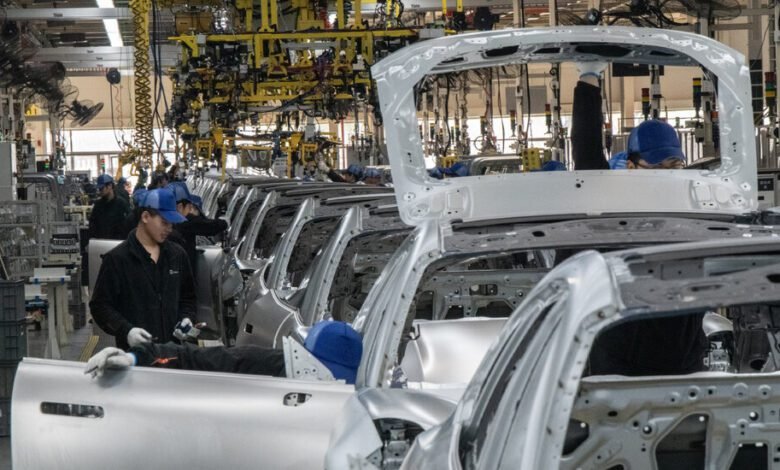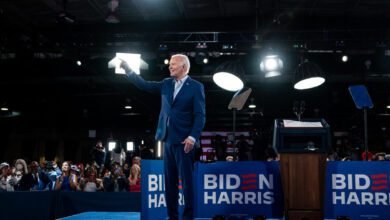Biden will increase tariffs on electric vehicles, chips and other Chinese goods

President Biden will announce on Tuesday that he is increasing tariffs on a range of Chinese imports, including electric vehicles, solar cells, semiconductors and advanced batteries, in what he calls an effort to protect strategic American industries from a new wave of competitors who are unfairly subsidized by Beijing.
The president will also officially support the maintenance of tariffs on more than $300 billion in Chinese products that were implemented by President Donald J. Trump. Biden criticized these tariffs as taxes on American consumers during his 2020 run for the White House.
Biden’s moves are the latest escalation of the trade war from a president who initially promised to repeal at least some of Trump’s tariffs but now refuses to cede any ground to his rival in a tough call on China to sway voters in the sector. industrial. Midwest and beyond.
They also reflect Biden’s efforts to build on Trump’s consensus-challenging trade confrontation with China while focusing on sectors of strategic importance to the United States, such as clean energy and semiconductors.
The tariff increase will apply to about $18 billion in annual imports from China, White House officials said. The biggest increase will be the quadrupling of tariffs on Chinese electric vehicles from 25% to 100%. This measure aims to protect an area of the American auto industry that is poised to receive hundreds of billions of dollars in federal subsidies to help the United States transition to a clean energy future.
Biden is banking on his efforts to use government investments in heavy industry, including electric vehicles and other green technologies, to create middle-class jobs and help win swing states that are home to parts of those industries. Biden aides gave a nod to trade policy before the announcement, highlighting states expected to benefit from the tariffs.
“We know that China’s unfair practices have harmed communities in Michigan and Pennsylvania and across the country that now have the opportunity to return because of President Biden’s investment agenda,” Lael Brainard, who heads the National Economic Council of the United States, told reporters. White House.
Brainard also criticized the Trump administration for what he called a “failed” effort to force China to change unfair trade practices.
Treasury Secretary Janet L. Yellen, who previously criticized the tariffs as taxes on consumers, said the new fees were justified because China’s excess industrial capacity posed a threat to the United States and its allies and to markets. emerging. She said the Biden administration would not allow cheap Chinese exports to harm American workers.
“President Biden and I have seen firsthand the impacts of outbreaks of certain artificially cheap Chinese imports on American communities in the past, and we will not tolerate it again,” Yellen said, explaining that the tariffs were not intended to be “anti- China.”
China’s Ministry of Commerce criticized the tariffs in a statement, saying China “firmly opposes this.” The statement called the Biden administration’s decision a “typical political manipulation” that “would seriously affect the atmosphere of bilateral cooperation”.
The statement called on the United States to rescind the decision, saying “China will take resolute measures to defend its rights and interests.”
Administration officials have long debated reducing some of Trump’s tariffs — which applied to a wide range of products, including apparel and home lighting — while raising rates in more strategic areas. But officials pointed to a long-awaited mandatory review by Biden’s trade representative, also scheduled to be released on Tuesday, which concluded that China’s flouting of international trade rules required keeping all tariffs in place.
Officials said this week they believe U.S. companies that sourced products and components abroad either adjusted to those initial tariffs or went through an official process to request tariff exclusions.
The relative value of goods subject to Trump’s original tariffs, compared to the much lower value of those targeted by Biden, reflects a crucial difference in their competing approaches to trade with China.
Trump has defended broad tariffs as a way to exert influence over China, given that its export economy remains highly dependent on the American consumer. While in office, he attempted to use tariffs as a club to negotiate more favorable terms of trade between countries and bring manufacturing jobs back to America, with little success.
Trump has promised to go even further if he wins in November – restricting investment between the two countries and completely banning some Chinese products from the United States. He also promised to apply this approach more broadly, subjecting all imports, regardless of their origin, to an additional 10 percent tariff.
Biden opted to increase Chinese tariffs in areas his administration has targeted for growth and where the United States has invested huge sums of money, including in clean energy technology and semiconductors.
The tax on Chinese solar cells will double to 50%. The tax applied to certain advanced batteries, along with the essential minerals needed to build them, will increase to 25 percent. Semiconductor tariffs will double to 50%. Some of these increases will be delayed, in an apparent effort to allow domestic companies time to increase their own production and find other sources outside of China.
Other tariffs will affect industries in key swing states, including heavy metals. Duties on certain imported steel and aluminum products will triple to 25%.
Biden will also increase tariffs on some medical equipment that officials consider essential to the pandemic response, including face masks and surgical gloves.
Administration officials viewed these increases as an appropriate response to the Chinese government’s “unfair and non-market practices,” including state subsidies to factories and what officials call the theft of innovative ideas from foreign competitors.
“China’s forced technology transfers and intellectual property theft have contributed to its control of 70, 80 and even 90 percent of the global production of critical inputs needed for our technologies, infrastructure, energy and healthcare – creating unacceptable risks to America’s supply chains and economy. security,” government officials said in a fact sheet distributed before the announcement.
A spokesperson for China’s Ministry of Foreign Affairs, responding to a question about the tariff reports, said at the ministry’s daily press conference on Tuesday that China “will take all necessary measures to safeguard its rights and interests.” legitimate.”
Many economists oppose tariffs because they tend to act as an effective tax on domestic consumers, increasing prices. Government officials said this week that they did not expect the tariff hikes to increase price growth — which is already uncomfortably fast for many consumers — because of how narrowly targeted they are.
Union leaders and Democratic lawmakers were expected to applaud the announcement, although some Democrats, such as Senator Sherrod Brown of Ohio, have already urged Biden to go further and ban Chinese electric vehicles.
The adoption of tariffs, first by Trump and now by Biden, reflects a growing awareness — inside and outside Washington — of Chinese trade practices that have cost American workers their jobs, said Adam Hodge, managing director of the communications firm. Bully Pulpit International in Washington and former spokesperson for Biden’s trade representative and the National Security Council.
“We heard about it,” Hodge said. “It’s smart policy because it responds to what Americans are seeing in communities across the country.”
Alan Rapport contributed reports. Si Yi Zhao contributed research from Seoul.




